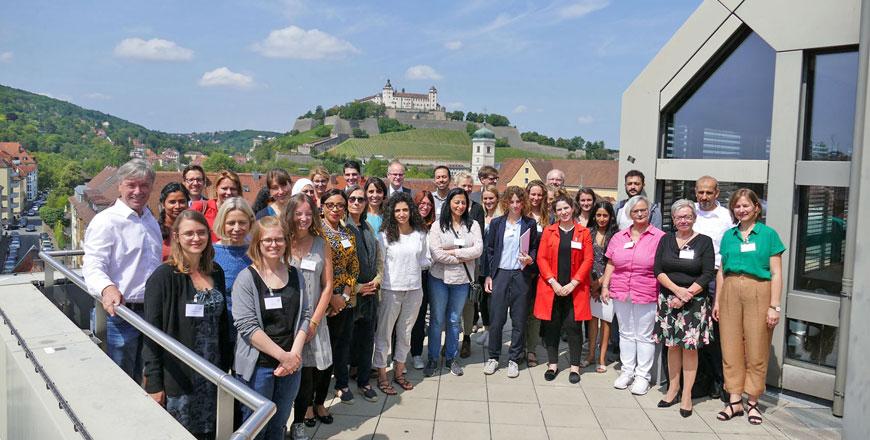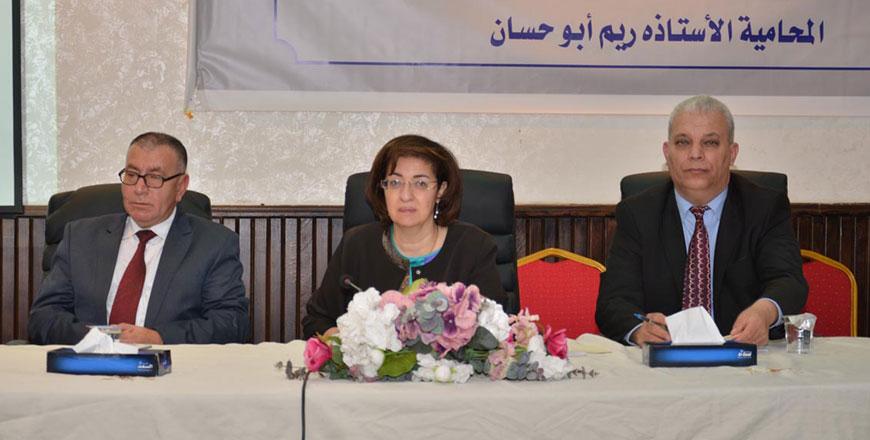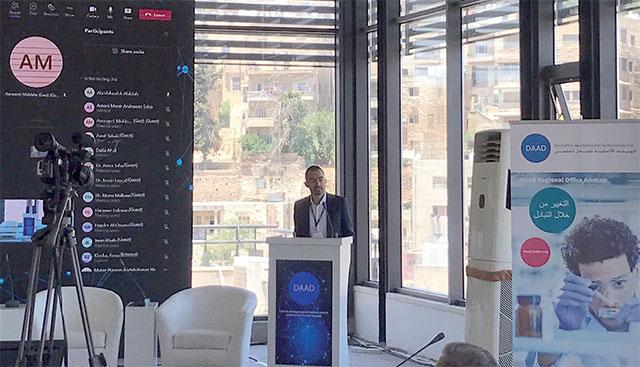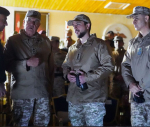You are here
Universities partner to rethink social work in region
By Johanna Montanari - Aug 04,2019 - Last updated at Aug 04,2019

Representatives of universities pose for a photo at a conference in July exploring ways to localise and adapt social work in Jordan and Lebanon (Photo courtesy of FHWS)
AMMAN — Earlier this year, the German-Jordanian University (GJU), Lebanese University, Yarmouk University and the University of Applied Sciences Würzburg-Schweinfurt (FHWS), started cooperating on a concept called localisation, which aims to adapt social work to its local circumstances by targeting the “postcolonial condition” of social work in the region.
Representatives from the four universities gathered at a conference in Würzburg in July, and another conference is planned for September in Amman, according to Ralf Rosskopf, the vice president of FHWS in Germany.
The FHWS has close connections with the GJU, Rosskopf told The Jordan Times.
“Since 2016, students from our international social work programme have gone to the GJU for one semester,” Rosskopf said.
Rosskopf, who will take over as vice president of GJU on August 15, said that the “postcolonial condition” of social work in the region began around the time of the British mandate in Jordan and the French mandate in Lebanon.
According to Rosskopf, teachers from Jordan and Lebanon are still mostly trained in the Anglo-American world getting their master’s or PhD in the US, the UK or even Germany.
“This has consequences for social work in the region. Most literature is imported from the west. It is read in English, or translated to Arabic,” he said.
“There are two necessities we want to talk about with the term localisation. One is to adapt western approaches to the circumstances in the Arab countries. And the other is to look for resources and structures within the Arab countries that Western social work did not think about and to ask how we could make use of it for social work in the region and beyond,” Rosskopf added.
Ayat Nashwan, director of the Refugees, Displaced Persons and Forced Migration Studies Centre at Yarmouk University, said professors are crucial when using western textbooks.
“He or she can adapt the material. When reading an example from the US, I would for example ask: OK, let’s compare this to the situation in Jordan,” she told The Jordan Times.
“I am very proud of the work of my centre,” she said, adding: “We don’t have a lot of social work programmes at universities in Jordan; four BA, two MA in the whole country. Social work is a new profession. It is not professionalised in Jordan, there is no licence for a social worker.”
However, according to Ahmad Abu Haidar from the Ministry of Social Development, there are efforts to professionalise social work in Jordan. “We are working towards professionalisation with an EU-funded project and also building a licensing scheme, not only for those who work in the public sector, but for the whole field of social work,” he told The Jordan Times on Sunday.
The ministry is partnering with Northern Ireland Co-operation Overseas (NI-CO) Jordan for the next three years in order to create an environment of highly professional social workers in Jordan, NI-CO employee Tommy O’Reilly told The Jordan Times.
This includes improving the curriculum for students who study social work, but also improving the skills of people currently working in the field as well as working on laws to allow for these changes, according to O’Reilly.
Nashwan stressed that social work in Jordan has a long history.
“UNRWA has hired social workers in Jordan since the 80s. Social work thrived with the influx of refugees. Mostly, social work is practised by international NGOs.
“There is some governmental social work, mostly in the poverty sector. And for example, the Jordanian Women Union hires social workers as well. However, the majority of social workers are hired by international NGOs. There, social work is more established,” Nashwan said.
Rosskopf stated that the funding of social work in Jordan is very dependent on Western institutions, donors and NGOs, which explained the focus on refugees.
“We have enough doctors and engineers, we need more people to go to the humanities now,” Nashwan said. “I wrote more than thirty recommendation letters for my students recently, all of them found jobs in great places.”
Related Articles
MADABA — The German Jordanian University (GJU) and the Technical University of Applied Sciences Wurzburg-Schweinfurt (THWS) on Sunday signed
AMMAN — “Professionalising” social work is key to elevating the level of provided services, Social Development Minister Reem Abu Hassan said
AMMAN — The German Academic Exchange Service (DAAD) regional office in Amman opened a conference on Wednesday on “German as a foreign langua

















